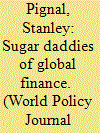| Srl | Item |
| 1 |
ID:
113169


|
|
|
|
|
| Publication |
2012.
|
| Summary/Abstract |
BRUSSELS-In a detailed three-page memo published nearly two decades ago, an unnamed European Union official set about codifying just what constitutes a good banana. Few could have predicted that "Commission Regulation (EC) No 2257/94 of 16 September 1994 laying down quality standards for bananas" would ever attract much outside attention. Even by the lexicon of regulatory documents, it is a turgid read. It lays down technical specifications for fruit imported or grown in the EU: their size ("minimum 14 cm"), how their crown is cut ("not beveled or torn") and their shape ("free from abnormal curvature"). The blameless Eurocrat behind it could not have guessed that his proposals, which became law the following year, would morph into a cause célèbre among detractors of the European Union.
|
|
|
|
|
|
|
|
|
|
|
|
|
|
|
|
| 2 |
ID:
133457


|
|
|
|
|
| Publication |
2014.
|
| Summary/Abstract |
LONDON-One of the cornerstones of Marxist-Leninist thinking is that the state should control the "commanding heights" of an economy-industry, agriculture, infrastructure, and, perhaps above all, money and banking. That vision has largely perished, with one gaping exception. Government remains omnipotent in the financial system, not only on Wall Street or Threadneedle Street, but far beyond. Across the world, the state weighs in on all sides of the ledger, insuring both a bank's assets (mortgages and loans) and its liabilities (deposits). State intervention in banking ranges from muscular day-to-day regulation through to crisis-time bailouts, and is an entirely accepted feature of the financial system. Financiers complain about excessive red tape, because that is what all businessmen do. But absent the state's involvement in their sector, it is a safe guess far fewer would still be gainfully employed following the carnage of 2008. Those who survived would likely find their ensuing careers to be nasty, brutish, short, and entirely devoid of outsized bonuses.
|
|
|
|
|
|
|
|
|
|
|
|
|
|
|
|